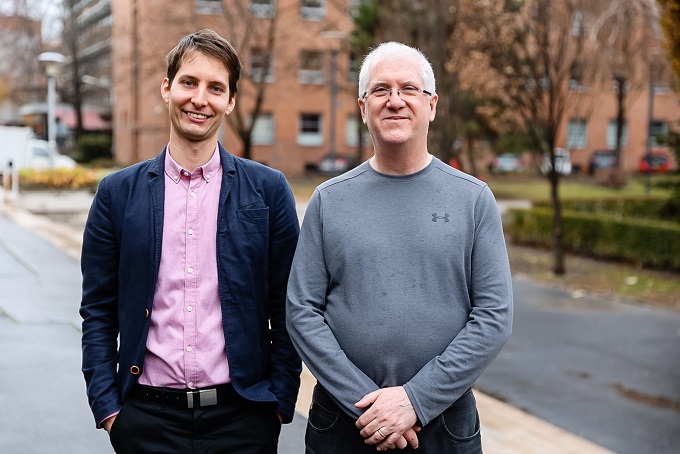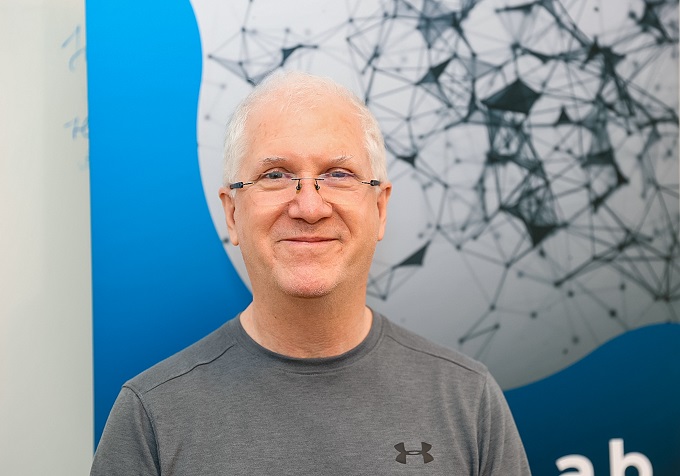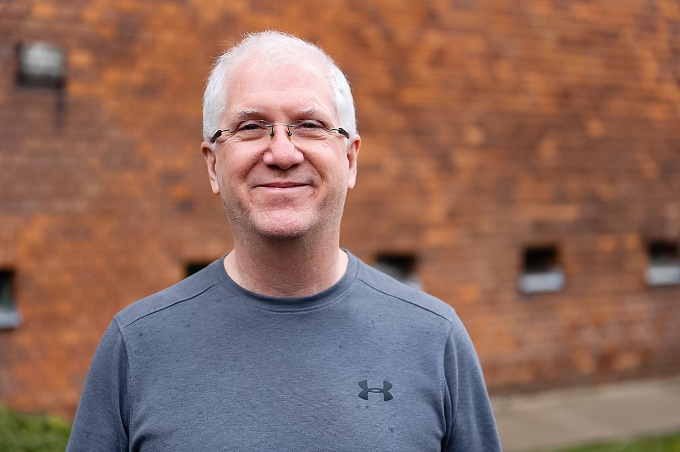2022. January 03.
"I knew that Hungary was strong in mathematics, but I was afraid that the mathematicians at the university would be too theoretically focused. Luckily I was wrong!"
We conducted a joint interview with Timothy E. O'Brien and Roland Molontay. The US visiting lecturer at BME is a Professor of Applied and Environmental Statistics at Loyola University Chicago, who is teaching and conducting research at BME this semester with the support of a prestigious Fulbright Scholarship. Roland Molontay is the head of the Human and Social Data Science Laboratory (HSDSLab) at the Institute of Mathematics at BME’s Faculty of Natural Sciences, Assistant Professor at the Department of Management and Business Economics at BME’s Faculty of Economics and Social Sciences, and the BME partner and host of the Fulbright Scholar Professor.

|
Timothy E. O'Brien has been a Professor at Loyola University Chicago, USA, since 1998. His field of research is applied and environmental statistics. After a Master's degree in Econometrics and Mathematics, he pursued his PhD studies in theoretical and applied statistics. In France and Germany, he conducted research in optimal design and nonlinear modelling. In 2006, he won his first Fulbright Scholarship to teach statistical modelling at Chiang Mai University in Thailand. He has made short study visits to Finland, Indonesia, Nepal and Thailand. He has been a visiting professor in Belgium, China, South Africa, Thailand and Uganda: he volunteers to provide mentoring assistance to young professionals doing research in mathematics across Africa. During the 2011/2012 academic year, he was appointed Senior Science Advisor to the US State Department and the US Agency for International Development (USAID) on topics ranging from public health, climate change, green growth and cross-cultural issues especially related to sub-Saharan Africa and South-East Asia. As a science fellow, he spent two months in Morocco, where he was involved in research in renewable and sustainable energy sources. At Loyola University Chicago, he teaches courses in mathematics and statistics, ranging from an introduction to environmental statistics to advanced optimal design theory. |
Why did you decide to apply for a Fulbright Scholarship at Budapest University of Technology and Economics? Why did you choose Hungary and BME?
T.E.O.B: I started to build an online professional relationship with my partner Roland Molontay, and I applied to BME because of him and the opportunities offered by his research group. One of the calls for applications of the Fulbright Programme supports visits to Hungary in the field of STEM (short for science, technology, engineering, mathematics; a collective name for the fields of natural sciences, technology, engineering and mathematics - ed.). Hungary has a very good reputation in my field, and Budapest is a very popular destination, so I decided to take the opportunity to apply. I was delighted to hear that my research project was considered worthy of support, as well as to be welcomed in Budapest. I came to BME with high expectations: Roland and his esteemed research team are doing scientific work that I have been able to join with my own research.

How was the selection process for the Fulbright Scholarship?
T.E.O.B: The Fulbright Programme supports visits to the USA and also US applicants who want to gain experience in another country. In both cases, there is a long selection process. Candidates must find a host institution that matches their field of expertise and provide the selection panel with a number of reasons why they would like to research, teach or study in the country and institution. I had already won a scholarship in Thailand in 2006, so I had to justify why I was applying again, what good experiences I had gained and how I had contributed to the teaching and research activities of partner institutions there almost a decade ago, and of course I needed recommendations. I prepared a detailed research and teaching plan for my stay in Budapest. To be fair, the Fulbright Programme is a rather competitive scholarship, where it takes a lot of effort to evaluate a large number of applicants, and it is difficult to compare applicants from different fields. I was very happy to have been selected, I was glad to come to Budapest and to Budapest University of Technology and Economics.
|
The Fulbright programme is a postgraduate educational, research and exchange fellowship programme established in 1946 by US Senator J. William Fulbright with the support of the US Department of State, the governments of partner states and the private sector. The main aim of the programme is to promote mutual understanding between countries and provide opportunities for scientific research and the exchange of ideas. The traditional Fulbright scholarships are open to graduate students, academics and researchers in any area of science or field of art. The exchange programme operates autonomously, under bilateral intergovernmental agreements, with the support of Fulbright Commissions in 51 countries around the world, US embassies in each country, and other organisations. Hungary joined the programme in 1978. |
Roland, what does the arrival of a Fulbright professor mean for your laboratory and the university?
R.M: It is an honour for our research group and the whole institution that an internationally renowned expert finds our research interesting and would want to participate in the scientific work being done here. His application is also a sign that our achievements are being followed internationally. Professor O'Brien has quickly fitted into both the research and teaching communities at the university; he works hard and his work has added tremendous value, including the teaching he gives to our students. He offers two long-awaited applied statistics courses for master’s and PhD students, which are new to the curriculum. Young people will be introduced to a new "American-style" teaching methodology, where the professor will engage students in useful and interesting discussions on a range of research topics. In addition to the students, our colleagues also attended the lectures with the aim of expanding their professional knowledge and transferring the knowledge gained to their own courses.
The professor is responsible for data science programmes at his alma mater. We are currently working on the development of similar courses at the Institute of Mathematics at BME’s Faculty of Natural Sciences, and the consultation with the professor was a great help in our work. The joint professional discussions and lectures have also contributed to making our lab even more a part of the international scientific community, and our colleagues have gained an even greater insight into international trends in applied statistics and data science education and research.
Professor, what courses do you teach at BME?
T.E.O.B: Applied statistical likelihood methods and longitudinal data analysis and time series. In both my courses I focus on combining theory and practice because I believe that, in addition to theoretical knowledge, it is also important for students to see how the results of these courses are used in everyday life. For example, data obtained from evaluating political opinion polls or analysing medical information are increasingly used to inform decisions on such issues. This is how the seemingly theoretical science of statistics becomes part of our everyday lives. In my classes, I introduce my students to the methodology and applications of data science in this area, including practical examples of climate change modelling and environmental data analysis.
R.M. The professor's courses were attended by master's and postgraduate students from several BME faculties. He has taught a special intensive course for MSc students at BME’s Faculty of Economics and Social Sciences and has been invited as a guest lecturer at several Hungarian higher education institutions (ELTE, Corvinus, University of Pécs, Rényi Institute, Budapest Semesters in Mathematics - BSM). We are proud that the University was the starting point for these wide-ranging knowledge-sharing activities.
Looking back several months later, what do you think of BME’s students and the Hungarian higher education system?
T.E.O.B: The young people at the university are curious, hard-working and always do their homework on time. I know my students by name; they often stop me after class to ask me questions. I am glad that they are concerned about the problems and dilemmas related to data analysis. In fact, they often bring in a case from their own field, so I also learn a lot about their field of engineering. In the USA, university lecturers place great emphasis on introducing students to the practical side of the subject as well as the theory. I am pleased to see that Hungarian higher education is also moving in this direction. I am happy to see that higher education in Hungary is highly respected both on campus and in the wider community.

What are your research plans for the future?
T.E.O.B: I would be happy to continue my academic work at BME as a visiting professor. Roland, his research team and I have already looked at the topics and areas where we hope to make new scientific advances through our collaboration. Lessons learned from courses for BME students suggest that there is still a lot of untapped potential in linking current statistical practice and predictive modelling techniques. I am currently working on making binary logistic models, which are commonly used in machine learning and biostatistics, more robust, and exchanges with colleagues in the research group of the Faculty of Natural Sciences would be a great contribution to this. I look forward to further opportunities to work with them, to publish jointly, and even to initiate new joint research.
How do you feel as a researcher at BME and in Budapest?
T.E.O.B: Budapest is a beautiful, captivating city. I'm having a great time. It is also a very inspiring environment for research. Roland is very helpful in facilitating meetings with researchers from other universities in Budapest and Hungary. I have given seminar presentations in several places and institutions. I knew, of course, that Hungary was very strong in mathematics, but I was a little worried about how open researchers here would be to translating theories into practice beyond theoretical mathematics. Fortunately, I was very positively surprised.
I really enjoy teaching, and I'm also working on a book, for which I'm sure I will draw on the experience of my courses at Budapest University of Technology and Economics. (Title of the forthcoming book: „Intermediate Methods in Applied Statistics and Biostatistics”).
Roland, as a university lecturer and host of the Professor, why do you think mobility programmes like Fulbright are important?
R.M: Like other Hungarian higher education institutions, Budapest University of Technology and Economics is working hard to increase its international visibility. Mobility programmes can also help us do this. Students also benefit from the presence of visiting professors at BME; they can learn new perspectives and attend courses that are not part of the institution's original curricula. Such a fellowship visit can also lead to joint scientific collaboration with local researchers. For example, it is a proven fact that articles produced in international collaboration have a higher citation index than publications where all co-authors are researchers in the same country. Similar benefits can be derived from the fellowship visits abroad by BME’s academics and researchers. Professor O'Brien is a refreshing addition to our academic work and teaching. He is an excellent and credible professional, as well as an engaging and inspiring lecturer. We would like to work with him in the future and we are confident that his lectures have sparked the interest of the younger generation in the potential of research and statistical applications.
TZS-HA
Photos: B. Geberle


